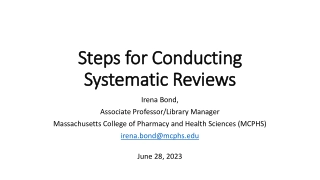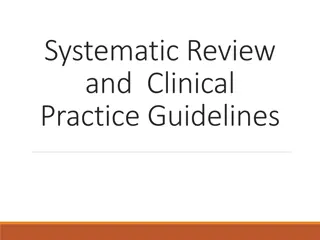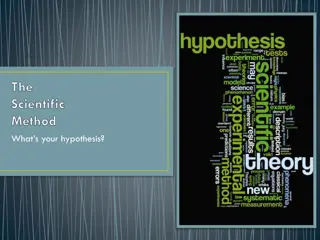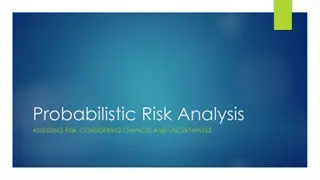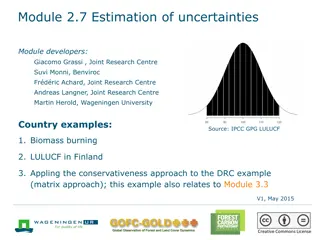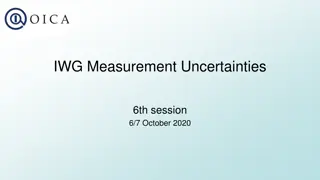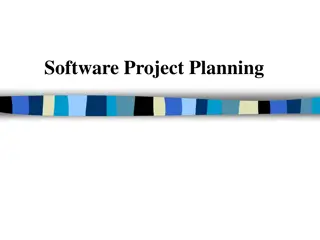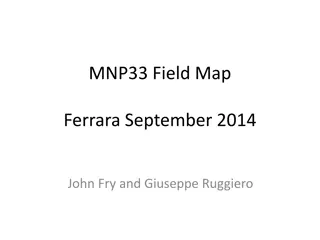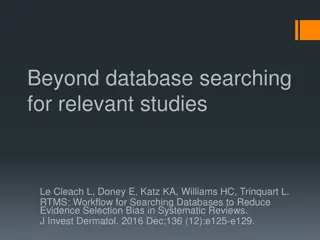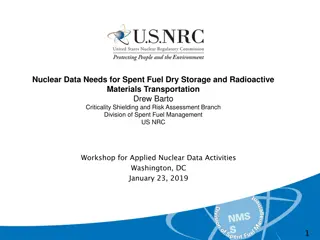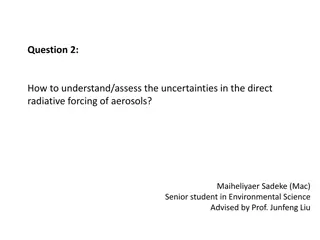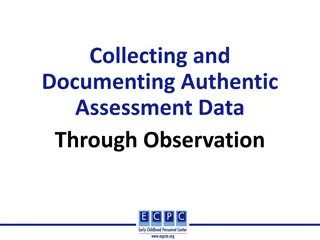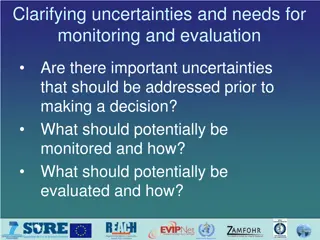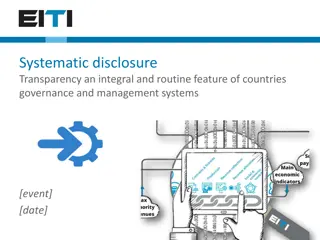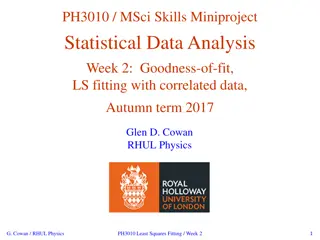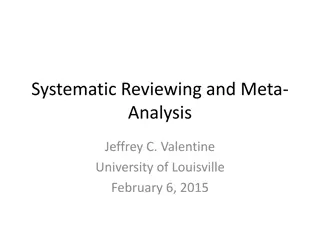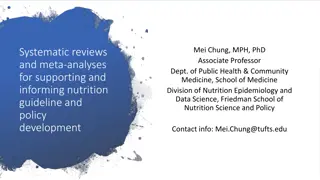Steps for Conducting Systematic Reviews
Systematic reviews are a crucial method for summarizing evidence effectively. This comprehensive guide by Irena Bond provides step-by-step instructions for beginners and junior researchers, including defining a research question, developing inclusion criteria, conducting a search, data extraction, q
5 views • 27 slides
Phonics: An Introduction to Systematic Synthetic Approach
Phonics is a fundamental method for teaching children to read by associating letters with their corresponding sounds. This systematic synthetic approach gradually introduces children to various ways of spelling sounds, building upon their existing knowledge. Implementing schemes like Little Wandle h
4 views • 23 slides
New Policy for Systematic Processing of Long Term Care Admissions
This policy outlines significant changes in the processing of long-term care admissions through MEDI, aiming to streamline the submission process, improve efficiency, and reduce delays in reimbursement. Key updates include systematic editing upon submission, eligibility criteria for systematic proce
2 views • 34 slides
Systematic Reviews, Meta-analysis, and Clinical Practice Guidelines
Explore the importance of systematic reviews, critical appraisal questions, meta-analysis, and clinical practice guidelines in the healthcare field. Learn about the process of appraising systematic reviews, the significance of meta-analysis, and the benefits of following clinical practice guidelines
2 views • 16 slides
Scientific Method: A Logical Framework for Problem-Solving
The Scientific Method is a systematic approach used to solve problems and seek answers in a logical step-by-step manner. By following key steps such as stating the problem, researching, forming a hypothesis, testing, analyzing data, and drawing conclusions, this method helps clarify uncertainties an
2 views • 18 slides
Probabilistic Risk Analysis: Assessing Risk and Uncertainties
Probabilistic Risk Analysis (PRA) involves evaluating risk by considering probabilities and uncertainties. It assesses the likelihood of hazards occurring using reliable data sources. Risk is the probability of a hazard happening, which cannot be precisely determined due to uncertainties. PRA incorp
2 views • 12 slides
Estimation of Uncertainties in Greenhouse Gas Inventories: Examples and Analysis
This module explores the estimation of uncertainties in greenhouse gas inventories with examples from biomass burning and LULUCF in Finland. It covers approaches, data used, calculations, and contributions to overall uncertainties. The examples illustrate the complexity and significance of uncertain
0 views • 23 slides
IWG Measurement Uncertainties: Justification of Impact Quantities
Explore the justification of main impact quantities in IWG Measurement Uncertainties session held on 6th and 7th October 2020. The analysis includes factors such as deviation from centered driving, start of acceleration, speed variations, load variations, background noise, temperature effects on noi
3 views • 25 slides
Effective Software Project Planning for Strategic Decision-Making
Software project planning involves making key decisions under limited resources throughout the project lifecycle. Analyzing risks, uncertainties, and uncertainties allows for better decision-making, often through buying information like prototyping. Project estimation is a crucial initial step that
0 views • 47 slides
Water Management Uncertainties and Performance Metrics Analysis
This content discusses the uncertainties in water management, including factors affecting outcomes, plausible ranges of uncertainties, and necessary information. It also covers the importance of performance metrics, measures, and indicators for evaluating system characteristics, along with acceptabl
3 views • 8 slides
Mapping of MNP33 Field in Ferrara - September 2014
Mapping the MNP33 Field in Ferrara in September 2014 involved precise measurements using 60 3-D Hall probes to produce a detailed field map of the area, crucial for NA62 physics analysis. The project required determination of sensor angles, correction of residual fields, and addressing systematic un
0 views • 45 slides
Methodological Choice and Key Categories Analysis in Greenhouse Gas Inventory Management
Methodological choice and key categories analysis play a crucial role in managing uncertainties in greenhouse gas inventories. By prioritizing key categories and applying rigorous methods where necessary, countries can improve the accuracy and reliability of their emissions estimates. Key categories
0 views • 24 slides
Managing Reporting Bias in Systematic Reviews - Strategies and Consequences
Reporting bias poses a significant threat to the accuracy of systematic reviews, with publication bias affecting up to 50% of trials. This bias distorts treatment effect estimates, leading to exaggerated outcomes. Strategies to mitigate reporting bias include searching bibliographical databases, exp
1 views • 17 slides
Navigating Uncertainty: Decision-Making by UK University Leaders
UK university leaders face challenges in assuring financial stability amidst global uncertainties like economic shifts, geopolitical tensions, and the impacts of Brexit and the pandemic. Issues encompass institutional uncertainties, financial obligations, and strategic planning processes to sustain
2 views • 11 slides
Nuclear Data Needs for Spent Fuel Management Overview
Nuclear Data Needs for Spent Fuel Dry Storage and Radioactive Materials Transportation workshop held by US NRC discussed criticality safety, burnup credit, code validation, and organizational aspects in the field. The Division of Spent Fuel Management highlighted transportation and storage regulatio
0 views • 11 slides
Navigating 25 Years of Euro Area Challenges: From Past Shocks to Future Uncertainties
Explore the journey of the Euro area over 25 years, from past challenges to current uncertainties. Dive into construction investments, real loans to NFC, and insights on Germany and Southern countries. Conclude with valuable observations on the economic landscape.
1 views • 10 slides
Model Evaluation in Meteorology
Model evaluation in meteorology involves verifying, hypothesizing, proving, and improving models through a systematic process. Factors such as error analysis, grid spacing, model resolution, domain size, computational errors, chaotic equations, and initial condition errors play critical roles in ass
0 views • 17 slides
Uncertainties in Direct Radiative Forcing of Aerosols
The uncertainties in the direct radiative forcing of aerosols can be assessed by considering factors such as emissions, lifetime, Mass Absorption Cross Section (MAC), Aerosol Absorption Optical Depth (AAOD), and forcing efficiency. Variations in these factors contribute to the overall uncertainty in
0 views • 9 slides
Insights from Ecclesiastes: Understanding Life's Uncertainties
Ecclesiastes provides profound reflections on the uncertainties of life, emphasizing that humans do not have complete knowledge of the future, their relationship with God, their time, or what is to come. The text encourages embracing joy, wisdom, and caution in navigating life's unpredictabilities.
0 views • 5 slides
Cryogenic Heat Load Measurement and Calibration at IHEP
Researchers at IHEP in Beijing, China, conducted heat load measurements for a 1.3 GHz Cryomodule, analyzing uncertainties in flow rate readings and calibrating mass flow rates. The study involved static and dynamic heat load measurements, utilizing various control interfaces and valves. Calibrations
0 views • 9 slides
Systematic Review of Marbled Murrelet Research in Oregon State Forests
A presentation to stakeholders in Salem, OR, on October 13, 2015, highlighted the systematic review conducted by the State Forests Division on Marbled Murrelet research. The review aimed to assess the science related to key elements of the PSG protocol and other hypotheses. The Division outlined the
0 views • 59 slides
Insights from Pierre Auger vs. The Machine Final Report
Comprehensive analysis of UHECRs using hadronic models, machine learning, and neural networks. Research highlights muon deficit, explores high-energy cosmic rays' origin and composition, and addresses systematic uncertainties in shower reconstruction.
0 views • 13 slides
Analysis Summary: Systematic Uncertainties and Fake Factor Evaluation
The weekly report dated 24/02/2020 by Shuiting Xin provides insights into systematic uncertainties in the data analysis procedure. Uncertainties originating from a data-driven method are discussed, with a focus on negligible uncertainties in certain scenarios. The evaluation of fake factors involvin
0 views • 4 slides
Statistics for Particle Physics in Benasque TAE 2022
Explore the world of statistics for particle physics through lectures at the Benasque TAE 2022 event. Dive into topics like probability, hypothesis tests, machine learning, and more. Get insights into experimental sensitivity and systematic uncertainties to enhance your understanding of data analysi
0 views • 79 slides
Key Issues and Uncertainties in Tert-Butanol (TBA) Induced Kidney Toxicity
This study discusses the key issues and uncertainties surrounding Tert-Butanol (TBA) induced kidney toxicity. It covers the role of alpha-2u globulin nephropathy, chronic progressive nephropathy (CPN), and the validity of concluding another unknown mode of action. Findings suggest TBA as a weak indu
0 views • 8 slides
Authentic Assessment through Systematic Observation: Best Practices
Explore the process of authentic assessment through systematic observation in early childhood education. Learn about collecting, documenting, and interpreting assessment data using evidence-based practices and technology. Discover the importance of working collaboratively with families and professio
1 views • 53 slides
Importance of Uncertainties in Land Surface Temperature Data Analysis
Uncertainties play a crucial role for users of Land Surface Temperature (LST) data as they help in understanding the degree of doubt in measured values. Claire Bulgin from the University of Reading emphasizes the difference between error and uncertainty, highlighting the necessity of considering unc
0 views • 14 slides
Importance of Clarifying Uncertainties and Needs for Monitoring and Evaluation
Uncertainties in decision-making require monitoring and evaluation to reduce risks, identify corrective actions, and ensure desired impacts. Rigorous evaluation is crucial for accountability and resource optimization, as emphasized by leaders like Julio Frenk. Caution is advised when relying on inco
0 views • 32 slides
Comparative Analysis of Traffic and Revenue Risks in Priced Facilities
This presentation at the 14th TRB National Transportation Planning Applications Conference discusses the background, process, and importance of sensitivity and risk analysis in traffic and revenue forecasts for toll road projects. It covers how risk analysis helps quantify uncertainties, determine i
0 views • 31 slides
Abrupt Climate Change: Impacts and Uncertainties
Abrupt climate change occurs when the climate system crosses a threshold, leading to a swift transition to a new state. This type of change, as discussed by Alley et al., brings uncertainties due to the complexity of identifying all causes and predicting outcomes near thresholds. The role of the the
0 views • 23 slides
Importance of Systematic Screening and Assessment in Pediatric Behavioral Health
This content discusses the significance of systematic screening and assessment tools in pediatric behavioral health. It highlights the rationale for using these tools to improve access, reduce bias, ensure comprehensive assessment, enhance validity, and efficiently triage patient needs. The case stu
0 views • 8 slides
Enhancing Governance through Systematic Disclosure and Transparency
Systematic disclosure and transparency play a crucial role in the governance and management systems of countries. This involves routine disclosure of information, such as financial data, to promote accountability and address gaps in information. The EITI Standard emphasizes the importance of mainstr
0 views • 23 slides
Goodness-of-Fit and Least Squares Fitting in Statistical Data Analysis
Exploring the concept of goodness-of-fit and least squares fitting in statistical data analysis, this content delves into quantifying the level of agreement between data and fit functions. It discusses evaluating fit quality, identifying when to consider alternative fit functions, and interpreting t
0 views • 20 slides
Overview of Non-Accelerator Neutrino Experiments and Programs
Non-accelerator experiments in the field of neutrino physics are expected to yield significant results between 2022 and 2030. Projects like PINGU, ORCA, JUNO, RENO-50, INO, Hyper-K, and DUNE aim to study neutrino mass hierarchy, CP violation, and non-oscillation phenomena. The design and constructio
0 views • 10 slides
Driving Low-Carbon Investments Through EU ETS Reform
Introducing a price floor in the EU ETS to address persistently low carbon prices and regulatory uncertainties, ultimately aiming to stimulate low-carbon investments. Mechanisms distorting EUA price formation, concerns over self-fulfilling prophecies, and the impact of external demand shocks are dis
0 views • 18 slides
Systematic Reviewing and Meta-Analysis
Explore the significance of systematic reviewing and meta-analysis in research literature, including definitions, options for conducting reviews, and reasons for the shift away from narrative reviewing. Discover the essential principles and future directions of systematic review practices.
0 views • 52 slides
Robust Design and Reliability-Based Design in Engineering
Robust design ensures a product can function effectively despite variations or uncertainties introduced during manufacturing, environmental conditions, or user interactions. This approach focuses on minimizing the impact of uncertainties without removing their causes, through altering design variabl
0 views • 30 slides
Role of Systematic Reviews in Nutrition Guideline Development
Mei Chung, MPH, PhD, an Associate Professor in the field of Nutrition Epidemiology and Data Science, plays a significant role in conducting systematic reviews and meta-analyses to support and inform nutrition guideline and policy development. Her work involves identifying research gaps, informing po
0 views • 5 slides
Equilibrium and Acid-Base Problems in Chemistry Lecture
In this lecture, topics such as Advanced Equilibrium, Acid/Base Equilibria, Systematic Method for solving chemical problems, Strong Acid/Strong Base scenarios, and General Comments on reactions are discussed. Examples using the systematic method are provided for practical understanding. Key points o
0 views • 13 slides
Bayesian Decision Networks in Information Technology for Decision Support
Explore the application of Bayesian decision networks in Information Technology, emphasizing risk assessment and decision support. Understand how to amalgamate data, evidence, opinion, and guesstimates to make informed decisions. Delve into probabilistic graphical models capturing process structures
0 views • 57 slides
